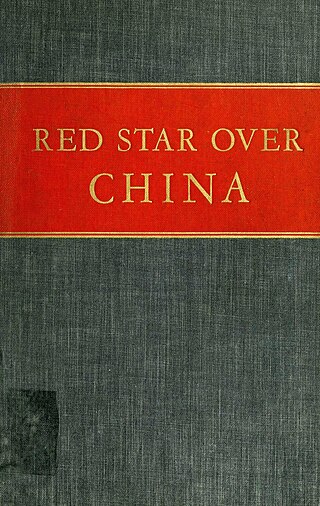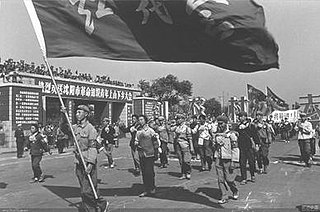
Mao Zedong, also known as Chairman Mao, was a Chinese politician, Marxist theorist, military strategist, poet, and revolutionary who was the founder of the People's Republic of China (PRC). He led the country from its establishment in 1949 until his death in 1976, while also serving as the chairman of the Chinese Communist Party during that time. His theories, military strategies and policies are known as Maoism.

Maoism, officially Mao Zedong Thought, is a variety of Marxism–Leninism that Mao Zedong developed while trying to realize a socialist revolution in the agricultural, pre-industrial society of the Republic of China and later the People's Republic of China. A difference between Maoism and traditional Marxism–Leninism is that a united front of progressive forces in class society would lead the revolutionary vanguard in pre-industrial societies rather than communist revolutionaries alone. This theory, in which revolutionary praxis is primary and ideological orthodoxy is secondary, represents urban Marxism–Leninism adapted to pre-industrial China. Later theoreticians expanded on the idea that Mao had adapted Marxism–Leninism to Chinese conditions, arguing that he had in fact updated it fundamentally and that Maoism could be applied universally throughout the world. This ideology is often referred to as Marxism–Leninism–Maoism to distinguish it from the original ideas of Mao.
The Hundred Flowers Campaign, also termed the Hundred Flowers Movement, the double hundred movement (双百方针) was a period from 1956 to 1957 in the People's Republic of China during which the Chinese Communist Party (CCP) led by Mao Zedong purposed to "let one hundred flowers bloom in social science and arts and let one hundred of view points be expressed in the field of science." It was a campaign that allowed citizens to offer criticism and advice to the government and the party. Hence, it intended to serve for an antibureaucratic purpose, at least on Maoists' part. The campaign resulted in a groundswell of criticism aimed at the Party and its policies by those outside its rank and represented a brief period of relaxation in ideological and cultural control.

Chen Boda, was a Chinese Communist journalist, professor and political theorist who rose to power as the chief interpreter of Maoism in the first 20 years of the People's Republic of China. Chen became a close associate of Mao Zedong in Yan'an, during the late 1930s, drafting speeches and theoretical essays and directing propaganda.

Red Star Over China is a 1937 book by Edgar Snow. It is an account of the Chinese Communist Party (CCP) that was written when it was a guerrilla army and still obscure to Westerners. Along with Pearl S. Buck's The Good Earth (1931), it was the most influential book on Western understanding of China as well as the most influential book on Western sympathy for Red China in the 1930s.
In the People's Republic of China since 1967, the terms "ultra-left" and "left communist" refers to political theory and practice self-defined as further "left" than that of the central Maoist leaders at the height of the Great Proletarian Cultural Revolution (GPCR). The terms are also used retroactively to describe some early 20th century Chinese anarchist orientations. As a slur, the Chinese Communist Party (CCP) has used the term "ultra-left" more broadly to denounce any orientation it considers further "left" than the party line. According to the latter usage, the CCP Central Committee denounced in 1978 as "ultra-left" the line of Mao Zedong from 1956 until his death in 1976. This article refers only to 1) the self-defined ultra-left of the GPCR; and 2) more recent theoretical trends drawing inspiration from the GPCR ultra-left, China's anarchist legacy and international "left communist" traditions.
Hai Rui Dismissed from Office (Chinese: 海瑞罢官; pinyin: Hǎi Ruì bà guān; Wade–Giles: Hai3 Jui4 Pa4-kuan1) is a theatre play, written by Wu Han (1909-1969), notable for its involvement in Chinese politics during the Cultural Revolution. The play itself focused on a loyal Ming Dynasty minister named Hai Rui, who was portrayed as a savior to passive peasants for whom he reversed unjust land confiscations. The play became a center of scholarly and political controversy because of its implications for debates within the communist party, including at the Lushan Conference, regarding the political role of peasants going forward in light of the failures during the Great Leap Forward.

The Lushan Conference was a meeting of the top leaders of the Chinese Communist Party (CCP) held between July and August 1959. The CCP Politburo met in an "expanded session" between July 2 and August 1, followed by the 8th Plenum of the CCP Eighth Central Committee from August 2–16. The major topic of discussion was the Great Leap Forward.

The Shanghai Revolutionary Committee was a revolutionary committee that had administered the city of Shanghai, People's Republic of China between 1967 and 1979. It was established on 24 February 1967, following the collapse of the Shanghai People's Commune during the Cultural Revolution, and replaced the former Shanghai Municipal Committee following its overthrow in the January Storm. The revolutionary committee was the first of its kind in China, and employed a "triple alliance" model where military personnel, revolutionary cadres, and the revolutionary masses jointly administered the government. Zhang Chunqiao is the committee's first chairman, while Peng Chong was its last chairman. The committee was eventually disbanded during reforms in December 1979, when the Shanghai Municipal People's Government was reintroduced.

The Up to the Mountains and Down to the Countryside Movement, often known simply as the Down to the Countryside Movement, was a policy instituted in the People's Republic of China between the mid-1950s and 1978. As a result of what he perceived to be pro-bourgeois thinking prevalent during the Cultural Revolution, Chairman Mao Zedong declared certain privileged urban youth would be sent to mountainous areas or farming villages to learn from the workers and farmers there. In total, approximately 17 million youth were sent to rural areas as a result of the movement. Usually only the oldest child had to go, but younger siblings could volunteer to go instead.
The Five Man Group was an informal committee established in the People's Republic of China in early 1965 to explore the potential for a "cultural revolution" in China. The group was led by Peng Zhen, the fifth most senior member of the Politburo.

The Campaign to Suppress Counterrevolutionaries was the first campaign of political repression launched by the People's Republic of China designed to eradicate opposition elements, especially former Kuomintang (KMT) functionaries accused of trying to undermine the new Chinese Communist Party government. It began in March 1950 when the Central Committee of the Chinese Communist Party issued the Directive on elimination of bandits and establishment of revolutionary new order, and ended in 1953.
The Sufan movement was a purge of perceived opponents in the People's Republic of China under Mao Zedong, between 1955 and 1957. The term "sufan" is short for "肅清暗藏的反革命分子", which means "to purge of the hidden counterrevolutionaries"; similar campaigns had been carried out within the Chinese Communist Party as early as 1932. Mao directed that 5 percent of counter-revolutionaries were to be eliminated. During the purge, around 214,000 people were arrested and approximately 53,000 died.
May Seventh Cadre Schools were a system of rural communes in China established during the Cultural Revolution to train Chinese Communist Party (CCP) cadres to follow the mass line, including through the use of manual labor.

Maurice Jerome Meisner was an American sinologist. He was a historian of 20th century China and a professor at the University of Wisconsin–Madison. His study of the Chinese Communist Revolution and the People's Republic was in conjunction with his strong interest in socialist ideology, Marxism, and Maoism in particular. He authored a number of books including Mao's China: A History of the People's Republic which became a standard academic text in that area.
People's democratic dictatorship is a phrase incorporated into the Constitution of the People's Republic of China and the Constitution of the Chinese Communist Party. The premise of the "People's democratic dictatorship" is that the Chinese Communist Party (CCP) and state represent and act on behalf of the people, but in the preservation of the dictatorship of the proletariat, possess and may use powers against reactionary forces. The term forms one of the CCP's Four Cardinal Principles. Implicit in the concept of the people's democratic dictatorship is the notion that dictatorial control by the party is necessary to prevent the government from collapsing into a "dictatorship of the bourgeoisie", a liberal democracy, which, it is feared, would mean politicians acting in the interest of the bourgeoisie. This would be in opposition to the socialist charter of the CCP.

Paul G. Pickowicz. is an American historian of modern China and Distinguished Professor of History and Chinese Studies at University of California at San Diego. He specialises in the history of China in the 20th century.
The Shengwulian or Sheng-wu-lien, derived from the Chinese acronym for the full name of Hunan Provincial Proletarian Revolutionary Great Alliance Committee, was a radical ultra-left group formed in 1967 during the Cultural Revolution. The rebel group became known for its opposition to local authorities installed by Beijing and for creatively re-interpreting the Cultural Revolution's official doctrine, becoming active during a period when the political trends of the Cultural Revolution were moving away from mass political mobilization.
Scarlet Guard organizations were political organizations formed during the Cultural Revolution in China to oppose the more radical Red Guards.
The 2nd Five-Year Plan was the second five-year plan adopted by the People's Republic of China. It was planned to last from 1958 to 1962, and was more modest than the first Five-Year Plan, but was de facto abandoned since the beginning of the Great Leap Forward.









